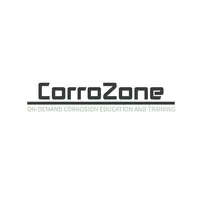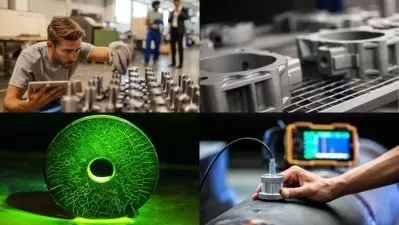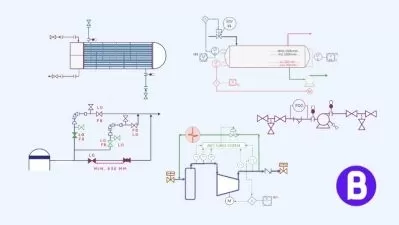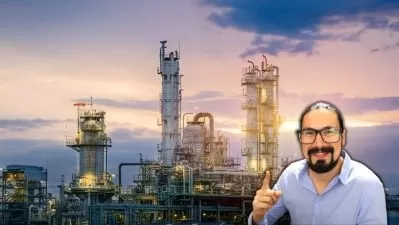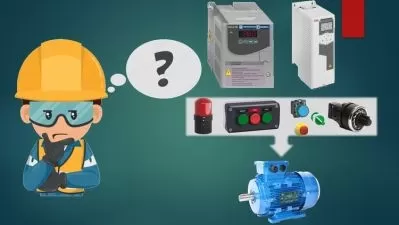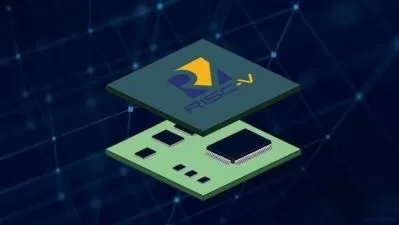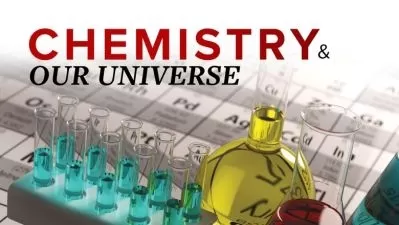Learn the Fundamentals of Corrosion Electrochemistry
CorroZone Ltd.
4:40:22
Description
Learn the theory and practice to get started acquiring and interpreting electrochemical measurement for corrosion.
What You'll Learn?
- Understand corrosion classifications
- Grasp aqueous corrosion's electrochemical nature
- Explain anodic/cathodic reactions
- Comprehend charge movement in metals and in electrolytes
- Understand standard potentials
- Use Nernst equation to calculate potentials in non-standard conditions
- Interpret Pourbaix diagrams in the context of corrosion
- Understand electrical currents in corrosion
- Comprehend three-electrode cell and potentiostat use
- Interpret current-potential diagrams for different reaction kinetics
- Understand Evans diagrams
- Use Stern-Geary equation for corrosion current estimation
- Interpret polarization curves for different corrosion mechanisms
- Be able to setup a three-electrode cell
- Convert potential measurements to hydrogen standard
- Understand key parameter to setup potentiodynamic and linear polarization experiments
- Understand the impact of electrolyte resistance on potentiodynamic polarisation curves
Who is this for?
What You Need to Know?
More details
DescriptionThis online course on corrosion electrochemistry focuses the electrochemical aspects of aqueous corrosion in five sections. As you progress through this course, you will develop a strong foundation in the understanding corrosion-related processes from an electrochemical perspective.
In the first section, "Electrochemical Nature of Aqueous Corrosion," you will learn about the fundamental principles and classifications of corrosion. You will learn to comprehend the electrochemical nature of aqueous corrosion, including anodic and cathodic reactions, the movement of electrical charge in metals and electrolytes, and the application of Faraday's law to corrosion-related calculations.
In the second section, "Corrosion Thermodynamics," you will about the thermodynamic aspects of corrosion. This section discusses the significance of potential measurements in corrosion, standard potentials, and the Nernst equation . You will become able to interpret Pourbaix diagrams to assess the thermodynamic feasibility of reactions based on pH and potential, gaining an understanding of how thermodynamics govern corrosion behavior for different metals/environment combinations.
In the third section, "Kinetics of Corrosion Reactions," you will focus on the kinetics of corrosion processes. Key concepts, such as activation-controlled reactions and diffusion-limited reactions, will be discussed. You will learn about the factors influencing cathodic reactions, including oxygen reduction and hydrogen evolution, and about the formation of protective oxide films.
In section four, "Corrosion Behaviors", you will learn to employ Evan's diagrams for analyzing corroding electrodes with multiple reactions and estimate corrosion currents using the Stern-Geary equation. You will gain the ability to interpret potentiodynamic polarization curves to assess corrosion mechanisms and analyze the behavior of passive metals in corrosive environments.
Finally, in the fifth section, "Electrochemical Measurements," you will learn about the practical aspects involved in conducting electrochemical measurements. This includes setting up a three-electrode cell, converting potential measurements to the hydrogen reference electrode standard, and distinguishing between potential limits referenced to the open circuit potential and the reference electrode. You will also learn to understand and manipulate key parameters for potentiodynamic polarization and linear polarization experiments, along with recognizing the impact of electrolyte resistance on potentiodynamic polarization curves.
By the end of this course, you will have a comprehensive understanding of corrosion electrochemistry from both theoretical and practical perspectives. You should be able to analyze, evaluate, and experimentally measure corrosion processes by linear polarisation and potentiodyynamic polarisation methods.
Please note that, due to the nature of the subjects, there is some unavoidable overlap in the topics discussed in this course and the course 'Introduction to Corrosion Science and Engineering'. If you are looking for a course that focuses on corrosion electrochemistry only, this is the course for you. If you are looking for a general course about corrosion ( corrosion mechanisms, corrosion protection measures, and minimal electrochemistry theory) the most appropriate course for you is 'Introduction to Corrosion Science and Engineering' available on this platform.
Who this course is for:
- Engineers working on corrosion willing to get started with electrochemical measurements or strengthen their fundamental knowledge on corrosion electrochemistry.
- Researchers entering the word of corrosion and looking for a solid foundation to perform and interpret electrochemical measurement for corrosion.
- Students starting a project on corrosion and willing to gain rapidly the fundamental knowledge at the basis of corrosion processes and get started in the lab.
This online course on corrosion electrochemistry focuses the electrochemical aspects of aqueous corrosion in five sections. As you progress through this course, you will develop a strong foundation in the understanding corrosion-related processes from an electrochemical perspective.
In the first section, "Electrochemical Nature of Aqueous Corrosion," you will learn about the fundamental principles and classifications of corrosion. You will learn to comprehend the electrochemical nature of aqueous corrosion, including anodic and cathodic reactions, the movement of electrical charge in metals and electrolytes, and the application of Faraday's law to corrosion-related calculations.
In the second section, "Corrosion Thermodynamics," you will about the thermodynamic aspects of corrosion. This section discusses the significance of potential measurements in corrosion, standard potentials, and the Nernst equation . You will become able to interpret Pourbaix diagrams to assess the thermodynamic feasibility of reactions based on pH and potential, gaining an understanding of how thermodynamics govern corrosion behavior for different metals/environment combinations.
In the third section, "Kinetics of Corrosion Reactions," you will focus on the kinetics of corrosion processes. Key concepts, such as activation-controlled reactions and diffusion-limited reactions, will be discussed. You will learn about the factors influencing cathodic reactions, including oxygen reduction and hydrogen evolution, and about the formation of protective oxide films.
In section four, "Corrosion Behaviors", you will learn to employ Evan's diagrams for analyzing corroding electrodes with multiple reactions and estimate corrosion currents using the Stern-Geary equation. You will gain the ability to interpret potentiodynamic polarization curves to assess corrosion mechanisms and analyze the behavior of passive metals in corrosive environments.
Finally, in the fifth section, "Electrochemical Measurements," you will learn about the practical aspects involved in conducting electrochemical measurements. This includes setting up a three-electrode cell, converting potential measurements to the hydrogen reference electrode standard, and distinguishing between potential limits referenced to the open circuit potential and the reference electrode. You will also learn to understand and manipulate key parameters for potentiodynamic polarization and linear polarization experiments, along with recognizing the impact of electrolyte resistance on potentiodynamic polarization curves.
By the end of this course, you will have a comprehensive understanding of corrosion electrochemistry from both theoretical and practical perspectives. You should be able to analyze, evaluate, and experimentally measure corrosion processes by linear polarisation and potentiodyynamic polarisation methods.
Please note that, due to the nature of the subjects, there is some unavoidable overlap in the topics discussed in this course and the course 'Introduction to Corrosion Science and Engineering'. If you are looking for a course that focuses on corrosion electrochemistry only, this is the course for you. If you are looking for a general course about corrosion ( corrosion mechanisms, corrosion protection measures, and minimal electrochemistry theory) the most appropriate course for you is 'Introduction to Corrosion Science and Engineering' available on this platform.
Who this course is for:
- Engineers working on corrosion willing to get started with electrochemical measurements or strengthen their fundamental knowledge on corrosion electrochemistry.
- Researchers entering the word of corrosion and looking for a solid foundation to perform and interpret electrochemical measurement for corrosion.
- Students starting a project on corrosion and willing to gain rapidly the fundamental knowledge at the basis of corrosion processes and get started in the lab.
User Reviews
Rating
CorroZone Ltd.
Instructor's Courses
Udemy
View courses Udemy- language english
- Training sessions 35
- duration 4:40:22
- Release Date 2024/05/18





